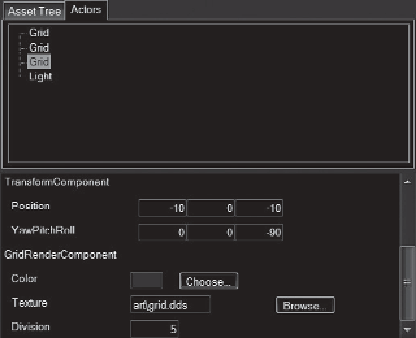Game Development Reference
In-Depth Information
Figure 22.4
The
ActorComponentsEditor
showing two components.
C++ classes, such as the
TransformComponent
, which stores position and orienta-
tion, or the
GridRenderComponent
, which stores the color, texture filename, and size
of a grid scene node. Each of these components has member data that should be exposed
to the editor. Exposing these data members to the editor would mean creating controls
like a text box to edit a filename or a combo box to make a selection from a list.
One method might be to simply write some C# code that mirrors each C++ compo-
nent. It does create a weakness in the editor, however. If the C++ component changes
by adding or removing data members, the editor must be changed, recompiled, and
redistributed to anyone using it. Wouldn
t a better solution be data driven?
Imagine an XML file that defined components from the editor
'
s point of view:
'
<Components>
<Component name=
“
TransformComponent
”
>
<Element name=
“
Position
”
type=
“
Vec3
”
fieldNames=
“
x,y,z
”
/>
<Element name=
“
YawPitchRoll
”
type=
“
Vec3
”
fieldNames=
“
x,y,z
”
/>
</Component>
<Component name=
“
GridRenderComponent
”
>
<Element name=
“
Color
”
type=
“
RGBA
”
/>
<Element name=
“
Texture
”
type=
“
File
”
extensions=
“
Image Files(*.JPG;*.GIF;*.DDS)
∣
*.JPG;*.GIF;*.DDS
”
/>
<Element name=
“
Division
”
type=
“
int
”
/>
</Component>
</Components>

